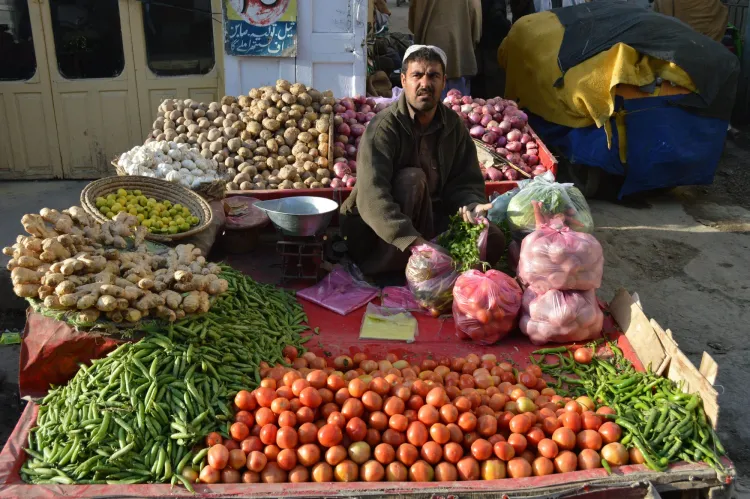Why Are Tomato Prices in Pakistan Soaring to Rs 600 per kg?

Synopsis
Key Takeaways
- Tomato prices soar to Rs 600 per kg in Rawalpindi due to supply issues.
- High demand and lack of imports from Afghanistan contribute to price hikes.
- Other vegetables like garlic and ginger also experience significant price increases.
- Ongoing tensions between Pakistan and Afghanistan are affecting food security.
- Dialogue and resolution are necessary for restoring market stability.
Islamabad, Oct 22 (NationPress) In Rawalpindi, the price of tomatoes has skyrocketed to Rs 600 per kilogram as the nation grapples with escalating vegetable prices linked to the ongoing unrest along the Pak-Afghan border, local reports indicated on Wednesday.
According to Ghulam Qadir, President of Rawalpindi's Sabzi Mandi Traders Union, the demand for tomatoes exceeds the available supply, and imports from Afghanistan have halted. He stated, "Until we see a complete restoration of supply, the surge in tomato prices is likely to persist."
The report further revealed that many small vegetable vendors have stopped selling tomatoes, peas, ginger, and garlic due to the inflated costs.
Currently, garlic is priced at Rs 400 per kg, while ginger has soared to Rs 750 per kg. Onions now cost Rs 120 per kg, and peas are being sold for Rs 500 per kg. In contrast, the price of capsicum has decreased to Rs 300 per kg, with okra also at the same rate. Cucumbers are available for Rs 150 per kg and local red carrots for Rs 200 per kg. Local lemons are priced at Rs 300 per kg, while coriander, which was formerly given away for free, now costs Rs 50 for a small bunch.
On the fruit side, apples range from Rs 250 to Rs 350 per kg and grapes are priced between Rs 400 to Rs 600 per kg. Pomegranates are available for Rs 400 per kg, while guavas are priced at Rs 170 per kg. A single coconut now costs Rs 400. For dozen pricing, sweet oranges range from Rs 250 to Rs 300, and bananas are priced at Rs 150 to Rs 200 per dozen.
This price escalation comes amid rising tensions between Pakistan and Afghanistan following airstrikes by Islamabad on Afghan soil and the large-scale deportation of Afghan refugees.
The Taliban government in Afghanistan emphasized the importance of a ceasefire and mutual respect in a recent statement. According to Afghanistan's Ministry of Defence, "The agreement with Pakistan underscores the significance of ceasefire, mutual respect, and non-aggression against each other’s security forces, civilians, and facilities. All matters should be resolved through dialogue, and any statements beyond these terms are invalid."
The conflict escalated when Pakistan commenced airstrikes targeting Kabul, leading to accusations of aggression from both Islamabad and Kabul.
Additionally, a vendor noted that vegetables imported from India through the Wagah border are less expensive compared to those from Iran, and attempts to import white onions from Iran failed due to taste issues.










